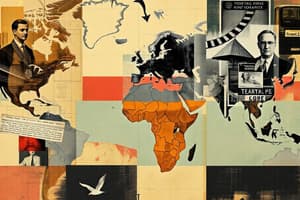Podcast
Questions and Answers
Which of the following can be considered a primary actor in the international system?
Which of the following can be considered a primary actor in the international system?
- Sovereign states (correct)
- Domestic political parties
- Multinational corporations
- International non-governmental organizations
What role do non-state actors play in the international system?
What role do non-state actors play in the international system?
- They have the same authority as sovereign states.
- They are solely focused on economic initiatives.
- They influence international relations from outside traditional state mechanisms. (correct)
- They are limited to regional activities.
Which factor can significantly alter the behavior of actors in the international system?
Which factor can significantly alter the behavior of actors in the international system?
- Technological advancements (correct)
- Climate conditions
- Population demographics
- Cultural traditions
Which of these is a determinant for the effectiveness of an actor in the international system?
Which of these is a determinant for the effectiveness of an actor in the international system?
How do ideological perspectives shape the actions of actors within the international system?
How do ideological perspectives shape the actions of actors within the international system?
Flashcards
International System
International System
The complex web of interactions between states and other actors, such as international organizations, NGOs, and multinational corporations.
State Actors
State Actors
Countries with recognized sovereignty and territorial boundaries, often considered the primary actors in the international system.
Non-State Actors
Non-State Actors
Organizations and groups that operate independently of states, yet significantly influence international affairs.
International Organizations
International Organizations
Signup and view all the flashcards
Multinational Corporations
Multinational Corporations
Signup and view all the flashcards
Study Notes
Introduction
- Actors in the international system are the entities that interact and shape global politics.
- Their behavior and actions are influenced by various internal and external factors.
State Actors
- States are the primary actors in the international system, possessing a defined territory, population, and government.
- Their actions are influenced by:
- Geopolitical location and resources
- Economic conditions and development level
- Military capabilities and strategic interests
- Domestic political structures and ideologies
- Level of public support for specific policies
- International norms and agreements
Non-State Actors
- Non-state actors include international organizations, NGOs, multinational corporations, and individuals.
- Their influence on the international system is growing.
- Factors influencing non-state actors include:
- Resources and funding
- Membership and organizational structure
- Public image and reputation
- Access to information and communication networks
- Influence of powerful states or institutions
International Organizations
- International organizations (IOs) are institutions established by states to facilitate cooperation and address global issues.
- Key IOs include the United Nations and its agencies, the World Trade Organization, and the International Monetary Fund.
- Factors influencing IOs include:
- Member state preferences and bargaining power
- Structure and rules governing the organization
- Resources available to the organization
- External pressures and global events
Multinational Corporations (MNCs)
- MNCs are businesses that operate in multiple countries.
- Their decisions and actions are often influenced by:
- Profit maximization
- Access to resources and markets
- Political and economic stability in host countries
- International trade regulations and agreements
NGOs
- Non-governmental organizations (NGOs) are groups that operate independently of governments.
- They play a role in advocating for specific issues and promoting particular agendas.
- Their actions are driven by:
- Mission and values
- Funding and resources
- Public support and mobilization
- Perceived legitimacy and influence
Individuals
- Individuals, including heads of state, political leaders, activists, and celebrities can significantly shape international outcomes.
- Their actions are driven by:
- Personal beliefs and values
- Political agendas and motivations
- Public opinion and support
- Access and influence networks
- Influence on state policies and decision-making
Interconnectedness of Factors
- The determinants of actor behavior in the international system are often interconnected and complex.
- For instance, a state's economic situation can influence its foreign policy decisions and interactions with other actors. Similarly, a state's geographic position might create both opportunities and challenges for economic and security pursuits.
- Interactions between these factors are dynamic and ever-changing, leading to unpredictable outcomes.
Conclusion
- Understanding the various determinants of actor behavior in the international system is crucial for analyzing and interpreting global events.
- Recognizing the interplay between internal factors like domestic politics and external ones like the international environment allows a more nuanced understanding of actor actions and their consequences.
Studying That Suits You
Use AI to generate personalized quizzes and flashcards to suit your learning preferences.
Description
This quiz covers the fundamental concepts regarding actors in the international system, focusing on both state and non-state actors. It explores the factors influencing their behavior and the roles they play in shaping global politics. Test your understanding of these critical elements of international relations.



